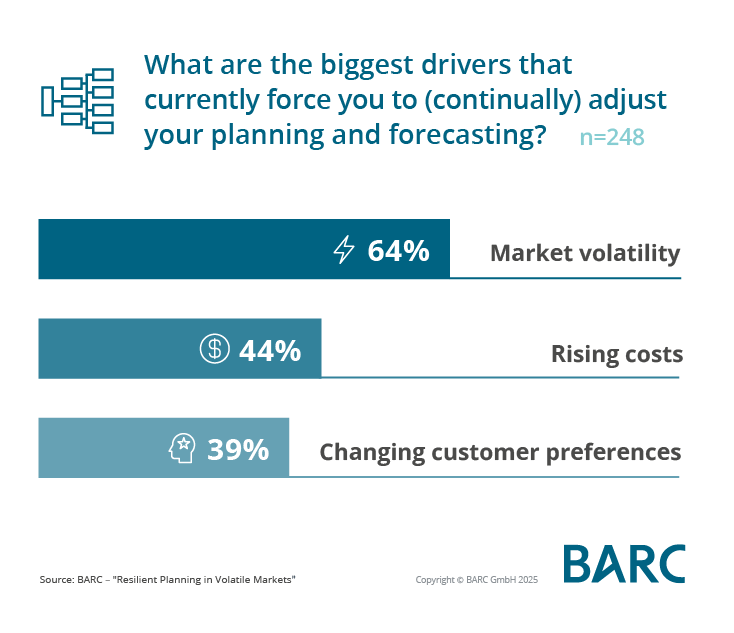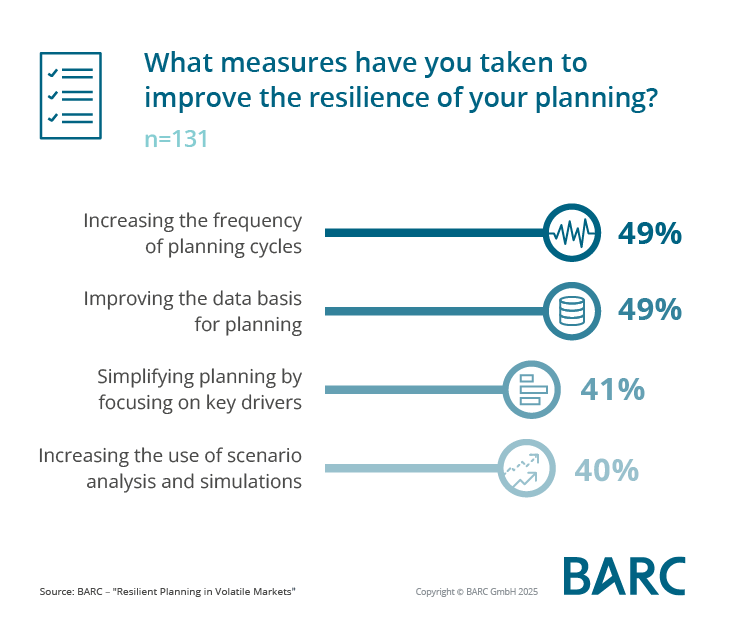Volatile Markets Challenge Corporate Planning – New Study
Volatility has become the new normal. Many companies struggle to keep their planning up to date and reliable. The new BARC study Resilient Planning in Volatile Markets, based on a global survey of 261 companies, shows: only 8% of companies believe they can produce stable plans for periods longer than twelve months. Even for horizons of six to twelve months, only 38% consider this realistic.
“The era of static annual plans is over. Companies need resilience and agility to survive in turbulent markets,” says Dr. Christian Fuchs, Senior Analyst and Head of Research at BARC. “Our study shows that while many organizations are working to strengthen their planning, most are still not using modern methods and technology sufficiently—and are thus exposing themselves to unnecessary risks.”
Volatility forces new approaches to planning
The results underline how strongly uncertainty is already shaping corporate management. 72% of respondents report significant disruptions caused by geopolitical uncertainty, market shocks, rising costs, and changes in customer behavior. These factors force them to regularly adjust planning and forecasting. However, only 6% have fully implemented measures for more resilient planning so far. 47% have not yet taken any steps, and 27% have not even planned such measures.
On the other hand, some companies are already responding: 49% have shortened their planning and forecasting cycles and improved their data foundations. 41% have focused their models on key drivers, and 40% are making greater use of simulations and scenario planning.

AI as a savior?
Many companies expect AI to play an important role in increasing the resilience of planning and forecasting: 40% plan to introduce predictive forecasting and AI-supported planning. They mainly expect AI to deliver early detection of risks and anomalies (51%), automated creation and updating of forecasts (47%), and faster evaluation of scenarios (44%).
Differences also emerge in the software being used. While 34% already rely on specialized planning tools (among leading companies this figure rises to 47%), 31% continue to work primarily with spreadsheets such as Excel. Respondents named the most important software functions for more resilient planning and forecasting as flexible modeling capabilities (62%), easy creation and comparison of scenarios (56%), and data integration from a wide variety of sources (56%).

Implications for companies
The study makes it clear: organizations that adopt shorter cycles, leaner models, scenario planning, and AI-supported forecasting are better equipped to deal with uncertainty and emerge stronger. Those that continue to cling to static annual budgets risk being unable to steer their businesses effectively when sudden shocks occur.
The study examines planning and forecasting practices, resilience measures, and the use of modern technologies across industries. It provides concrete recommendations for action and highlights best practices from leading companies.
The full study Resilient Planning in Volatile Markets is available here.
